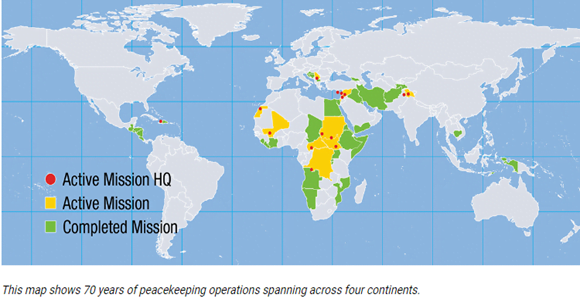International Relations
Context: U.N. Peacekeeping chief in an interview says that Troop- and police-contributing countries need to be very much in the loop and involved in the process of making decisions on peacekeeping, and have been making a lot of efforts to improve the geographical diversity of nations providing the forces.

About UN Peace keeping forces:
- The first time UN Peacekeeping Forces were first deployed in 1948 when the UN Security Council authorized the deployment of UN military observers to the Middle East.
Three basic principles of UNPKF:
- Consent of the parties:
- UN peacekeeping operations are deployed with the consent of the main parties to the conflict. This requires a commitment by the parties to a political process.
- Impartiality:
- United Nations peacekeepers should be impartial in their dealings with the parties to the conflict, but not neutral in the execution of their mandate.
- Non-use of force except in self-defense and defence of the mandate:
UN peacekeeping operations are not an enforcement tool. However, they may use force at the tactical level, with the authorization of the Security Council, if acting in self-defense and defence of the mandate.
- UNPKF brings together the General Assembly, the Security Council, the Secretariat, troop and police contributors and the host governments in a combined effort to maintain international peace and security.
- The Security Council to determines when and where a UN peace operation should be deployed.
- The Security Council establishes a peace operation by adopting a Security Council resolution. The resolution sets out that mission’s mandate and size.
- The Security Council can vote to extend, amend, or end mission mandates as it deems appropriate.
- Currently there are 12 UN peacekeeping operations deployed on three continents.
UNITED NATIONS MILITARY OBSERVER GROUP IN INDIA AND PAKISTAN (UNMOGIP) is deployed in Jammu & Kashmir to supervise the ceasefire between India and Pakistan on 24 January of 1949.
- The UN Peacekeeping force is supplemented by personnel from member nations on a volunteer basis.
Department of Peace Operations (DPO):
- DPO provides political and executive direction to UN peacekeeping operations around the world and maintains contact with the Security Council, troop and financial contributors, and parties to the conflict in the implementation of Security Council mandates.
Women, Peace, and Security is a key commitment of the Action for Peacekeeping initiative
- Through UN Security Council resolution 1325, ensuing resolutions, as well as the Action for Peacekeeping (A4P) Declaration of Shared Commitments, the UN has called for an expansion of the role and contribution of women in its operations, including of uniformed women peacekeepers.
- The Action for Peacekeeping (A4P) initiative views the Women, Peace, and Security agenda as critical to enhancing peacekeeping operations’ performance through supporting women’s full participation in peace processes and making peacekeeping more gender-responsive, including through increasing the number of civilian and uniformed women in peacekeeping at all levels and in key positions.
- A4P has been signed by 152 Member States, a number of which have come forward to specifically champion implementation of A4P’s WPS commitment: Bangladesh, Canada, Finland, Germany, Ireland, Italy, Norway, South Africa, and the United Kingdom.
Source: The Hindu













